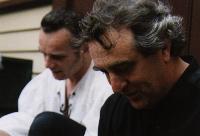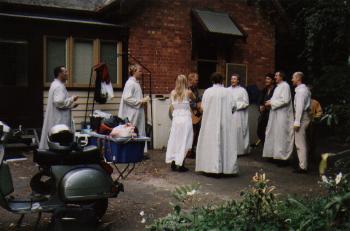![]()
THE PRO-FILE
 ACTING OUTDOORS (PART
ONE)
ACTING OUTDOORS (PART
ONE)
In March 2002 when we spoke Mike Bishop was appearing as Malvolio in Glen Elston's outdoor Melbourne Botanical Gardens production of Shakespeare's "Twelfth Night".
This was a part co-op venture and combined with the style of the production this provided a number of potential topics for discussion. There was the business aspect of managing a career and an actor's choice of employment; the process of performing Shakespeare and problems posed by playing outdoors.

The Twelvth Night cast warm-up pre-show
Mike: Let's start with the business end first. In terms of it being a part of your acting skills … business that is … so in terms of Australia there are very few shows that run for three months … very few theatre shows. You might get a musical comedy or a musical that lasts for three or four months or goes on tour and that's a very concerted experience. But we don't get much of that in Australia. What we do is - M.T.C. and Playbox. They are creating shows that are one, two or three handers (there are very few big shows) that run for a three week or a four week season and you don't get a chance to hone your character or develop your character over three months … which is three times as long …
Richard: So you learn three times as much, do you?
Mike: It's probably more like six times as much because ... it's accumulative. Particularly when you get the experience of performing to an audience of twenty-five one night and the next it might be four hundred. When you get that experience of performing to twenty-five you have to well up the same energy that you would for four hundred and even though it's not so spontaneous you have to get it from somewhere. So you go out there with even more energy than you would in front of four hundred (who are creating a sort of energy for you 'cos there's life out there). When there is an audience of twenty-five in a huge space it's like performing in a morgue. So somehow you have to find some humour in the morgue.
It's hard to
describe what the process is exactly but it's kind of ignoring
and accepting at the same time. You have to ignore the fact that
it's such a small audience and get on with the thrust of the
show and do it with as much zest or zeal as you would with a
larger audience. That's the kind of creative angle of it. The
business/monetary side of it is … that despite the fact
that it's a co-op and people are earning half as much or perhaps
a quarter as much as they would earn at M.T.C. or Playbox it's
done because of that creative side I mentioned. It's done because
the learning you do through your creative self makes up for the
fact that you are not earning much money. So therefore during
the day, in any way you can, you are trying to find a lot of
other things to do that will make up the money that supports
the family.
Richard:
What
things are you doing during the day?
Mike: I say to every young actor coming into the business that you have to have about ten to twelve strings to your bow that are mostly but aren't necessarily acting related … so there is:
- Tutoring (in groups, individually or for the institutions)
- Reading at Vision Australia library for the Blind
- Going for any audition that might be going
- Voice overs
- Corporate video's
- Making music where it's appropriate
- I also have a cricket business that teaches kids from 5 - 11 how to play cricket
- I also have a footie business that teaches kids from 5 - 11 how to play football
- And a wholesale marketing business that looks at earning money in a residual form,
- In addition I am now doing some M.C. work. I did the Coffee Festival here at South Gate.
That's an area that I never looked into before - and it's a lucrative area. I earned twice as much money MC'ing for three hours at the Coffee Festival as I do in one whole week of Twelfth Night. It's astonishing
So there's a broad array of potential money earning things that I think we all should look at - I don't just mean actors, I mean everyone - but very few people get a chance to because they're ensconced in whatever they are doing to pay the bills.
You know when Ansett airlines went down, I thought that an actor is really in a better position than an Ansett employee in the sense that we are more flexible. We are used to rejection, we are able to get out there and be enthusiastic even though we may have just lost a job, which we do all the time because your show finishes or you are working in a show that's not earning you any money anyway. So you have to be really buoyant the whole time - you have to be a bit like the cork popping up in the ocean … you have to keep on sticking your head up.
Richard: You are very good at that.
Mike: Yeah, well … a lot of us are … a lot of us. I think that people who have survived in the industry for thirty years have got to be said to be buoyant.
You know every audition I go to … that's from commercials, film right through to theatre … every audition I go up against people who are my equal and whom I have known for years. It's the greatest thing in the world to walk into an audition room and re-acquaint yourself with some folks you may not have seen for a while and some who you may have seen regularly because you've gone to the same audition for three weeks in a row. And you know that each one of these people are equally worthy of the job 'cos they have also survived for thirty years in the industry. They're all good.
But when you are beginning there is often a certain amount of jealousy of others.
Richard: So what is the list of skills you have that help you survive as an actor? Your list suggested that you are a musician as well as an actor.
Mike: Yeah, that's right. Improviser, musician, actor - they're three pretty important ones I think, although not everyone can improvise.
Look, I think communication is the greatest tool an actor has and I mean communication across a spectrum of things. You might be able to be an M.C., you might be able to talk to a group of kids about a play, you might be able to speak to a group of adults about the voice and tutor them in ways to produce it. Communication on all levels is the most important skill an actor has - to survival. If you can't you are cutting off all sorts of possibilities.
Richard: There are two elements of that communication you are talking about. One is the knowledge you have accrued and the other is the interest you have in sharing it to help people. Do you think they are significant factors in the things you do?
Mike: I do. For example to coach at Neighbours you have to have the knowledge to do things very efficiently because the hours are not long. You know, you've got to grab people when you can; you have to say exactly what you feel about the scene; you have to be able to gauge what level they're at as an actor and you have to speak to that level - otherwise if you are speaking from a Webster Dictionary level to someone who for example doesn't know how to read, you are not going to be able to communicate very well. So you have to be able to go anywhere on that scale of knowledge and be able to communicate your ideas to these people quickly and effectively. So that's combining the wish to help with the knowledge you have … so yeah, I think they're inseparable. Sometimes you know someone can speak with knowledge and not be very effective.
Richard: Absolutely. And that's the difference between the person who can teach and the person who can't.
Mike: Yep. Which is why in my cricket clinics I hire actors and entertainers (in the main) to teach the kids. I do not hire cricketers. I hire entertainers who know the game and may not have been the best cricketers in the world. But by gee, those kids get a good time and eventually they know how to catch and bowl and bat … with confidence. The idea of the sessions is that the whole tenor is one of positive encouragement. So teaching can be a useful avenue for an actor.
In the next part of this interview Mike Bishop discusses his approach to auditions and shares his experience on performing in the open air. Plus practicalities of maintaining the voice.
< BACK TO THE PRO-FILE
INTRO | ABOUT | WORKSHOPS & CLASSES | TESTIMONIALS | LATEST NEWS | WORKING ACTOR
GREENROOM | DIRECTOR'S NOTES | QUOTARIUM | DIARY | OFF-CUTS | AUDITIONS | CONTACT
All contents copyright © The Rehearsal Room unless othewise stated
|
|
|
|
||||||
|---|---|---|---|---|---|---|---|---|
|
|
|
|
||||||
|
|
|
|